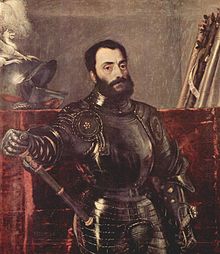Francesco Maria I Della Rovere
| Francesco Maria I | |
|---|---|

Portrait by Titian
|
|
| Duke of Urbino | |
| Reign | 11 April 1508 – 1516 |
| Predecessor | Guidobaldo I |
| Successor | Lorenzo II de' Medici |
| Reign | December 1521 – 20 October 1538 |
| Predecessor | Lorenzo II de' Medici |
| Successor | Guidobaldo II |
| Born |
22 March 1490 Senigallia, Duchy of Urbino |
| Died | 20 October 1538 (aged 48) Urbino, Duchy of Urbino |
| Spouse | Eleonora Gonzaga |
| Issue | Giulia, Lady of Montecchio Elisabetta, Marchioness of Massa Guidobaldo II, Duke of Urbino Cardinal Giulio Ippolita, Duchess of Montalto |
| House | Rovere |
| Father | Giovanni della Rovere |
| Mother | Giovanna da Montefeltro |
Francesco Maria I della Rovere (22 March 1490 – 20 October 1538) was an Italian condottiero, who was Duke of Urbino from 1508 to 1516 and 1521 to 1538 when he retook the throne from Lorenzo II de' Medici.
He was born in Senigallia, the son of the Papal captain and lord of that city, Giovanni della Rovere, and of Giovanna da Montefeltro, daughter of Federico III da Montefeltro. He was also the nephew of Giuliano della Rovere, Pope Julius II.
His uncle Guidobaldo I of Urbino, who was heirless, called him at his court, and named him as heir of that dukedom in 1504 through the intercession of Julius II. In 1502 the della Rovere had lost the seigniory of Senigallia, occupied by Cesare Borgia, then the most powerful figure in the Marche: Francesco Maria and his mother were saved from the slaughter perpetrated by Borgia's troops by the then-land soldier Andrea Doria. When in 1508 Guidobaldo died, Francesco Maria became duke of Urbino; thanks to the support of his uncle the pope he could also recover Senigallia after Borgia's death.
In 1508 he married Eleonora Gonzaga (1493–1570), daughter of Francesco II Gonzaga, Marquess of Mantua and Isabella d'Este.
In 1509 he was appointed as capitano generale (commander-in-chief) of the Papal States, and subsequently fought in the Italian Wars against Ferrara and Venice. In 1511, after he had failed to conquer Bologna, he had the cardinal Francesco Alidosi killed by his troops, a cruel action for which he was compared to Borgia himself. In 1513 he was created also lord of Pesaro.
...
Wikipedia
